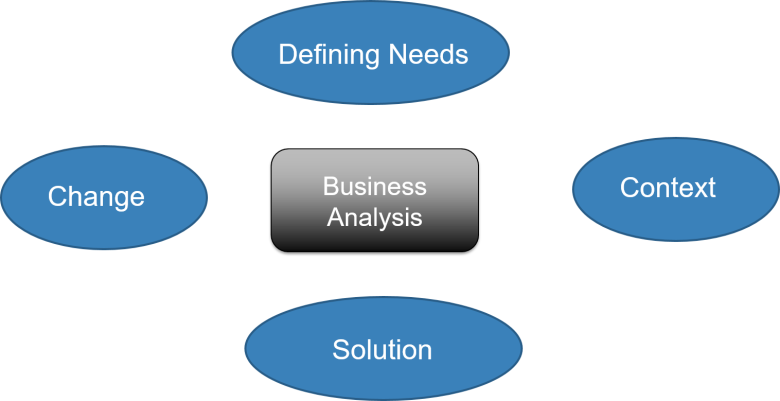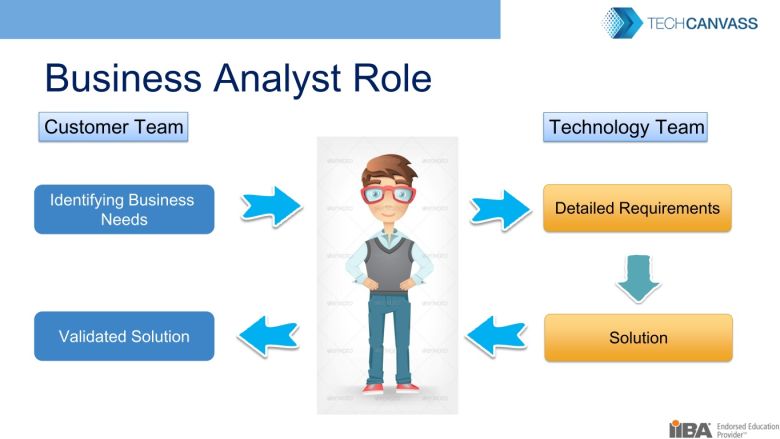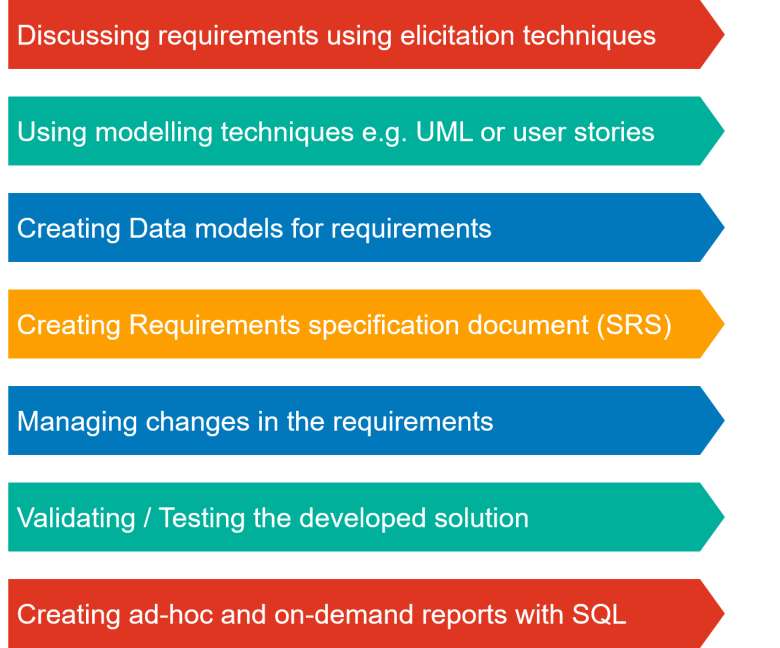Business Analysts are the key supporters of every business. They help analyze, promote and operate business data and guide them to improve their success. Business Analyst Roles and Responsibilities vary from organization to organization. These agile workers march the gap between IT and businesses to improve the overall functionality of any business.
A Business Analyst’s Roles and Responsibilities also include engaging with the corporate leaders and the customers to understand the gap between the product and its makers. This helps them promote actual business problems in front of the authority to take reasonable actions.
Becoming a BA requires a lot of struggle and patience because it is one of the most prestigious journeys in the corporate world. Techcanvass is an organization that provides the best Business Analysts Certification Training to candidates who want to become successful Business Analysts. We are an IIBA Endorsed Education Provider (EEP), iSQI ATP (for Certified Agile Business Analyst Training), and an Agile Testing alliance partner for CP-SAT certification training in Selenium.
In addition, you can always reach out to us in case of any help required to study and become a goal-oriented Business Analyst. For every Business Analyst aspirant, it’s important to understand the Role of a Business Analyst. As this will help in preparing oneself to succeed in the role. In this article, I am going to discuss the Business Analyst’s Role and Responsibilities.
Business Analyst Roles and Responsibilities
Business Analyst term is used to refer to two distinct profiles and that is often confusing for many. In general, the IT industry is using the term Business Analyst to refer to:
- IT Business Analyst or Systems Analyst: We are going to discuss this role in the article
- Business Analyst / Data Analyst / Analytics professionals/Data Scientists – This role is different than the IT Business Analyst, even though there are similarities.
It’s pertinent to explain what is business analysis so that we can understand the role of an IT business analyst in the right context.
What is Business Analysis and Who is A Business Analyst?
The International Institute of Business Analysis (IIBA) defines Business Analysis as follows:
Business Analysis is the practice of enabling change in an organisational context, by defining needs and recommending solutions that deliver value to stakeholders.
This formal definition leads to the following diagrammatic representation of “What is business analysis”.

So Business Analysis is all about solving a business problem/need using the organizational context and transitioning the organization through the change (implementing the solution).
So, Who is a Business Analyst?
A Business Analyst is a professional who performs one or all of the Business Analysis functions. He or she may not get involved with all the functions, defined as Business Analysis functions.
A Business Analyst, in general, is agnostic of the method/techniques used to solve a business need/problem. He/she may use statistical models, machine learning, or software development methodologies to achieve the end goal.
This is one of the reasons why there is the widespread use of Business Analysts in multiple contexts. In this article, we are going to focus on IT Business Analysts only.
What is The Role of A Business Analyst?
An IT Business Analyst works with customers as well as the technology team on a day-to-day basis. The diagram below shows a high-level view of an IT Business Analyst role:

Here is the summary of the role of an IT business analyst:
- To interact with customers to understand their requirements
- To convert the business requirements into detailed technical requirements for the technology team
- To coordinate with the technology team to explain the requirements
- To validate the developed solution before handing it over to the customer for User Acceptance Testing (UAT)
- To coordinate with the customer team and the technology team to facilitate UAT
So, what does it translate to? What are the typical responsibilities of a business analyst on a day-to-day basis? Let’s discuss them in the next section.
Watch More – What does a Business Analyst do?
Business Analyst’s Responsibilities
A Business Analyst will be performing one or more of the activities on a day-to-day basis:

These activities are the primary responsibility areas for an Entry-Level Business Analyst. He/she may not be doing all of them every day. The activities differ based on the stage of the project. Let’s consider these scenarios:
Managing Changes
In case of changes in the existing system (already in use by the customer), a Business Analyst has the following responsibilities:
- Understand and Document The Requirements: It is a necessary skill for any Business Analyst if they are working in corporate culture. Understanding and comprehending the document list is the most required step after initiating and completing the project. BA’s Roles and Responsibilities include documenting everything properly, preparing reports, and presenting the final results to potential clients.
- Create The Specifications Document: If any project requires additional inputs from the client’s end, in that case, the BA’s Roles and Responsibilities include converting them into simpler and understandable forms. Work with the technology team to assess the impact of the change. Business Analysts are supposed to coordinate with the technical team to monitor and assess the changes done for the project or branding. The factors that require monitoring are cost, team effort, client requirements, etc.
- Seek Customer Approval: A Business Analyst’s major Role is to coordinate with clients and stakeholders to seek their validation. When customer dealing, BA is responsible to take the charge and make the changes suggested if any.
- Validate The Developed Solution: Business Analysts may be called the face of the company. They are responsible for the overall structuring, validation, and approval of the project.
- Coordinate the UAT: After completing all of the preceding processes, the next and most crucial duty of a business analyst in agile is to put whatever has been planned into action.
Read More – Top 5 Challenges faced by Business Analysts
New Project
A New Project is completely different from an ongoing project. In the case of a New Project, a Business Analyst’s Responsibilities are as follows:
- Understand and Document The Requirements: As a Business Analyst, it is his/her primary role to determine what stakeholders require and communicate these needs to developers, as well as to communicate the developer’s expectations to stakeholders.
- Create A Prototype or UML Model: A Business Analyst may be considered a member of the software team, but their primary duty is unrelated to the team’s work. He must make certain that he determines what a project requires.
- Develop Data Model: Data modeling is an essential part of any project processing. A Business Analyst is responsible for developing these models to keep everything in sync which results in proper project delivery.
- Prepare System Requirements Specifications (SRS) Document: Every system has different requirements which need to be fulfilled on time. The business Analyst is responsible to prepare the blueprint of all the requirements specifications for various domains.
- Coordinate With The Technology Team: After the product has been developed, it must be tested among users to determine its operating capacity and quality. According to the role description, the Business Analyst tests the prototype/interface by involving certain clients and recording their experiences with the model that has been produced.
- Understand The Requirements of The Businesses – The Business Analyst’s primary role is to work with project stakeholders to understand their needs and translate them into details that developers can comprehend. Furthermore, to interpret the developers’ emerging query into specifics that stakeholders can learn. The capacity of the Business Analyst to filter the various messages and the requirements of the project stakeholders or customers into a coherent, single vision is a vital skill necessary for this part of the process.
- Building a Team – Everyone is born with a unique set of abilities. The Business Analyst’s job is to assemble a team of people with the various skills required for the project. Not only is hiring essential but so is keeping them. A well-coordinated and skilled team can do incredible things. Coordination, structuring, and skills are essential in a superb section inside. A strong team may propel a firm to new heights of success.
Business Analysts play an intermediary role between the customer team and the technology team to ensure that the right software is developed for the customer.
Conclusion
Although a Business Analyst is a different position inside an organization, its functions and responsibilities are critical to success. While he must be a strong orator, he must also have the ability to pull people closer to his team and across the board. His responsibilities are not restricted to a single Project Management stage. He must take one extra step until the end. A Business Analyst’s skills are required from the beginning phases of evaluation to maintenance.
Techcanvass offers various Certified Business Analysts Courses and training for becoming top-notch accredited Business Analysts. The Business Analyst’s Roles and Responsibilities differ from the other profession, and we understand them. Therefore, we provide IIBA-certified courses to enhance your analytical and problem-solving capability to become successful Business Analysts. If you want to learn more about it, visit our website or contact us directly.

